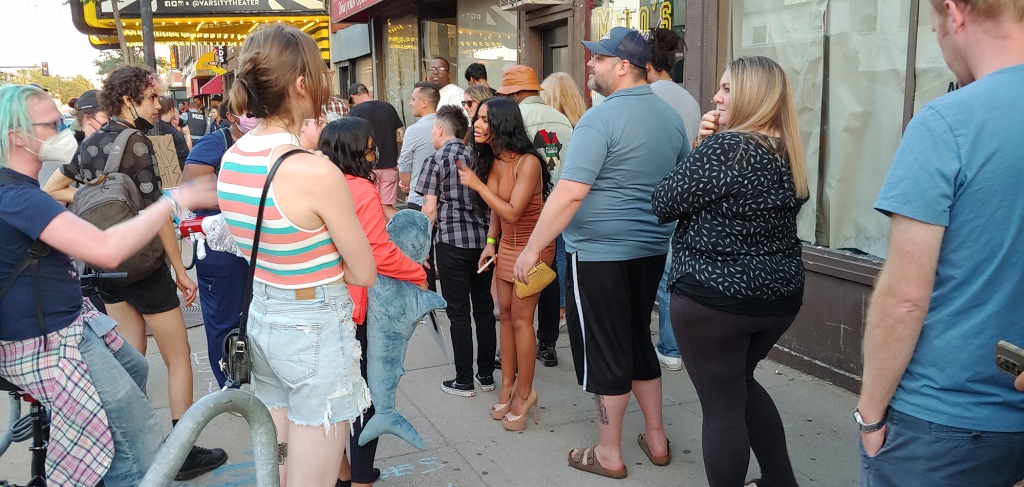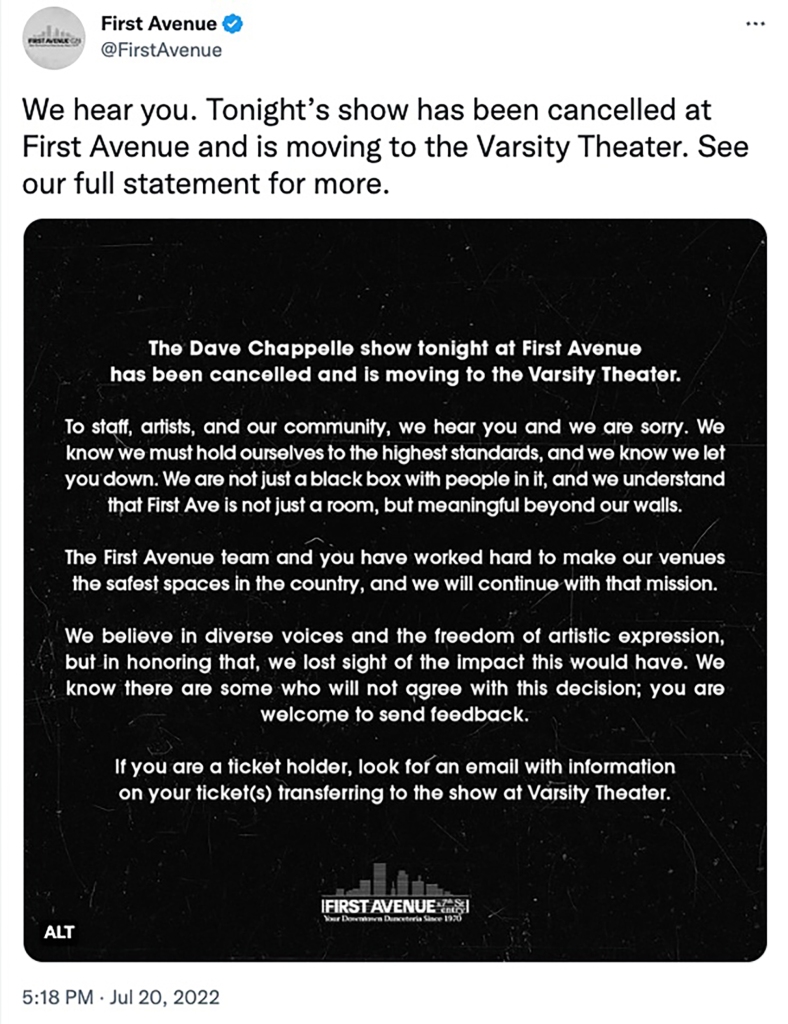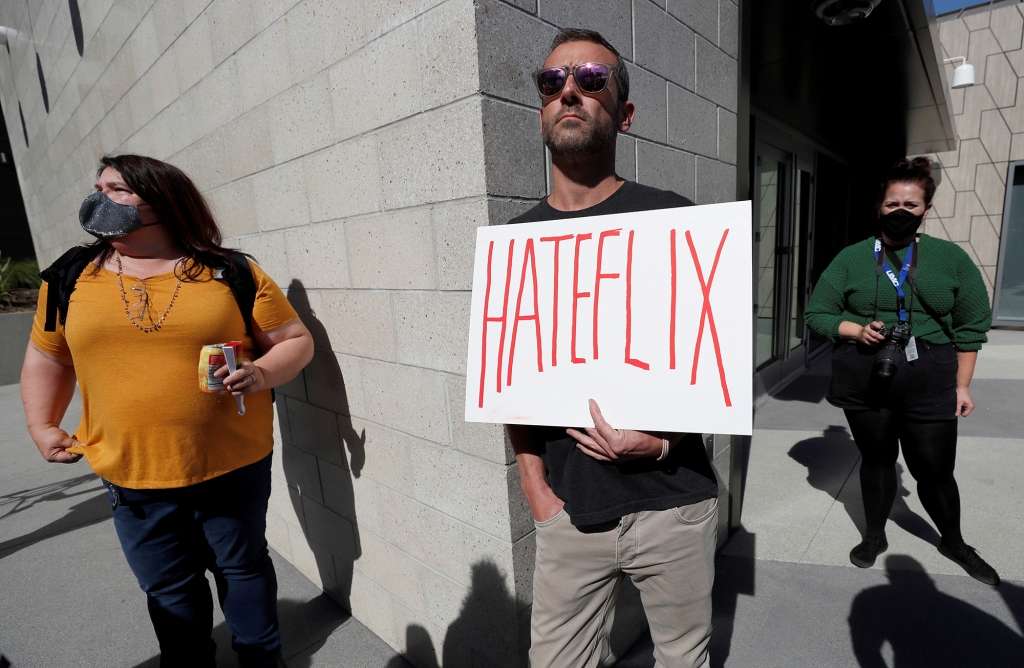Dave Chappelle rips trans activists using violence to protest him
Dave Chappelle has ripped the apparent hypocrisy of trans-rights protesters using the very violence they accuse his comedy of inciting.
In a live special for his podcast “The Midnight Miracle,” the 49-year-old funnyman recalled the protests outside his July shows in Minnesota following calls to cancel him for jokes about the transgender community.
“These were grown people of various genders and gender identities” who “threw eggs at the people lined up to see the show,” he said.
“One lady was so madm” she “picked up a police barricade” to use against fans still willing to see him at the Varsity Theater in Minneapolis, he told his audience.
“This b—h picked that barricade up by herself and threw it at the crowd,” he recalled, quipping: “I gotta tell ya, it’s an amazing feat of strength for a woman.”
In the podcast co-hosted with Brooklyn rappers Talib Kweli and Yasiin Bey, Chappelle noted the irony of the protesters resorting to such behavior given their accusations against him and his ongoing material about them.
“One of the things that these people, the trans and their surrogates, always say is that my jokes are somehow gonna be the root cause of some impending violence,” he said.
“But I gotta tell you, as abrasive as [the activists] were — the way they were protesting, throwing eggs at people, throwing barricades, cussing and screaming — nobody beat ’em up,” he said, joking that even “the crowd at a Luther Vandross concert would f–k these n—as up.”
He dismissed the suggestion that a push to cancel him was driven by “love.”
“They want to be feared. ‘If you say this, then we will punish you — we will come to … f–k your show up,’” he said. “And they just don’t get to do that to me.”
Chappelle said that on the second night of protests, he “made a point to try to speak to them” — admitting it was a “huge f—ing mistake.”

Of the 15 or so protesters, only about three of them looked “lucid” while the other 12 were just sticking to the playbook: “‘We’re here to stir s–t up,’” he said.
“I feel like they wanted me to say something inflammatory … in a weird way, I think some of them had the intention of inciting violence against themselves for publicity,” he said.
When one “mean” activist “screamed” at him for addressing them as “Ma’am” without knowing how they identify, Chappelle said he replied: “Well, whatever you identify as — you’re a white one.”
“And she never objected to that,” he said, suggesting they were “a bunch of white people … trying to tell a n—a to shut up.”
While the anger did not stop Chappelle from taking the stage, it did see him booted from performing at his first choice of venue, Minneapolis’ First Avenue club, famed for Prince’s “Purple Rain” movie.

Despite being booked after his Netflix comedy special already sparked controversy with his trans jokes, Chappelle said his gigs at the “best rock club in the country” were canceled at the very last minute as part of an apparent “pledge” to be a “safe space.”
“I wasn’t mad that they canceled the show. I was mad at the statement they released,” he said of club telling “staff, artists, and our community, ‘We hear you and we are sorry.’”
“You’re sorry? For booking me?” he asked.
However, Chappelle insisted that the club’s owner — whom he called a married lesbian who was “of that community” — told him “that the reason she canceled that show was fear.”
“That Minneapolis has been under siege since George Floyd was murdered” and that “the types of threats they will make and she was not accustomed to.”
In his shows, Chappelle has declared that “gender is a fact” and defended “Harry Potter” author JK Rowling, saying that he is also a proud member of “Team TERF,” meaning trans-exclusionary radical feminists.
After Netflix walkouts, employee complaints and social outcry, he was attacked onstage by an armed audience member, Isaiah Lee, during a show at the Hollywood Bowl in May.

Addressing all of his critics, Chappelle said: “I’m not even mad that they take issue with my work. Good. Fine.
“What I take issue with is the idea that because they don’t like it, I’m not allowed to say it,” he said on his podcast.
“Art is a nuanced endeavor. I have a belief that they are trying to take the nuance out of speech and American culture.
“They’re making people speak as if they either own the right or the left, everything seems absolute, whereas any opinion I respect is way more nuanced than these binary choices that they keep putting in front of us.
“I don’t see the world in red or blue … and I think art is the perfect place to talk it out,” he said.
“In fact, [it] may be the last place.”
Read the full article Here


